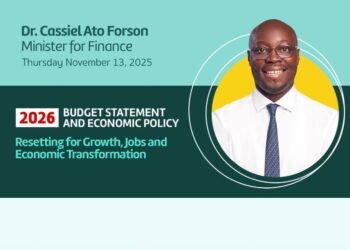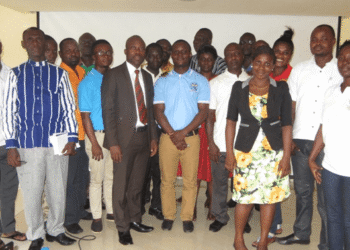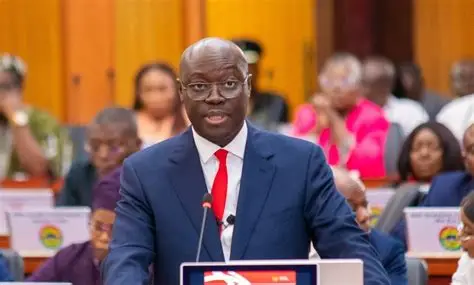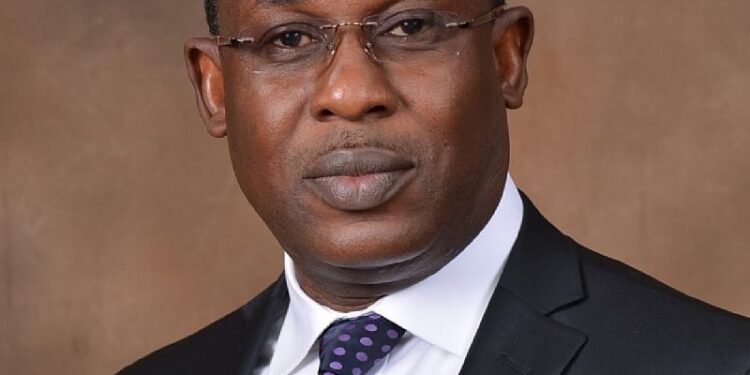Ghana’s concerted efforts towards economic recovery have received a significant validation on the international stage, as global ratings agency Fitch elevated the nation’s Long-Term Foreign-Currency Issuer Default Rating (IDR) from ‘Restricted Default’ to a more stable ‘B-’ with a Stable Outlook.
This pivotal upgrade is widely interpreted as a resounding endorsement of the decisive fiscal and debt management strategies spearheaded by Finance Minister Dr. Cassiel Ato Forson, signaling a robust turnaround for the West African economy.
The positive reassessment underscores a burgeoning confidence among international financial bodies in Ghana’s trajectory towards macroeconomic stability and sustainable growth.
Fitch’s commendation of Ghana’s economic performance was meticulously articulated, crediting the upgrade to several critical achievements.
Central among these was the successful restructuring of a substantial $13.1 billion in Eurobond debt, a monumental task that has significantly eased the nation’s external financial pressures.
Beyond debt management, the agency pointed to Ghana’s steady progress in fiscal consolidation, a testament to disciplined expenditure and revenue generation efforts.

Improving Macroeconomic Outlook
Complimenting these fiscal achievements, Fitch also highlighted an improving macroeconomic outlook, characterized by a discernible deceleration in inflation, a notable strengthening of the Ghanaian cedi, and a tangible rebound in investor confidence.
These indicators collectively paint a picture of an economy meticulously navigating its path out of recent turbulence.
Reacting to the encouraging news, Finance Minister Dr. Cassiel Ato Forson expressed profound satisfaction, describing the upgrade as a “significant milestone” and a powerful “vote of confidence in Ghana’s future.”
His statement conveyed an unwavering resolve, promising that this positive development is “only the beginning” of a broader mission.
Dr. Forson reiterated the government’s steadfast commitment to fully revive the economy, with the ultimate aim of delivering lasting relief and shared prosperity to the Ghanaian populace.

Ghana’s Impressive Gains
The journey to this improved rating is underscored by impressive gains in key economic indicators. Inflation, which had soared to an uncomfortable peak of over 50% from latter end of 2022, has demonstrated a remarkable decline, reaching 18.4% by May 2025.
This figure represents the lowest inflation rate recorded in more than three years, providing tangible relief to households and businesses alike.
Fitch’s projections offer further optimism, forecasting a continued downward trend, with inflation expected to hit 15% in 2025 and stabilize at 10% by 2026.
Concurrently, the Ghanaian cedi has experienced significant appreciation since April, a development that has directly contributed to easing import costs and fostering greater stability in fuel prices, both critical for consumer purchasing power and industrial operations.
Under the guidance of Dr. Forson, Ghana’s fiscal landscape has undergone a dramatic transformation. The nation’s fiscal deficit has narrowed sharply, reflecting stringent budgetary controls and effective revenue mobilization strategies.
Critically, debt levels are projected to decline significantly, from a staggering 93% of GDP in 2022 to an anticipated 60% in 2025, a trajectory that signals improved debt sustainability and reduced financial vulnerability.
Furthermore, Ghana’s gross international reserves have seen a healthy increase, reaching $6.8 billion, bolstering the country’s capacity to manage external shocks and support its currency.
The government’s ambitious target of achieving a primary budget surplus of 1.5% by the end of the year further solidifies its commitment to fiscal prudence.
Ghana’s Resurgence
Adding to the narrative of resurgence, recent data released by the Ghana Statistical Service (GSS) painted an equally vibrant picture of economic vitality. Ghana’s economy commenced 2025 on a decidedly positive note, recording an impressive growth rate of 5.3% in the first quarter.
This performance surpasses the 4.9% registered during the corresponding period in 2024, indicating accelerated momentum. Particularly encouraging is the remarkable turnaround within the non-oil sectors, which experienced an even more robust growth of 6.8%.
This growth trajectory is a powerful reflection of increased economic activity across various segments and a strong rebound in vital sectors such as Services and Agriculture.
Such performance offers renewed hope for the country’s post-pandemic recovery and its ambitious fiscal consolidation goals, suggesting that the foundations for long-term prosperity are being steadily laid.

The recent rating upgrade is expected to unlock significant opportunities, facilitating Ghana’s re-entry into global capital markets, thereby easing borrowing costs and attracting renewed investment across key economic sectors.
This positive momentum promises to cascade into various aspects of national life, translating into job creation, improved public services, and enhanced living standards for all Ghanaians, marking a new chapter of economic optimism and resilience for the nation.
READ ALSO: Supreme Court Nominee Urges ‘Refinement’ of Ghana’s Jury System























